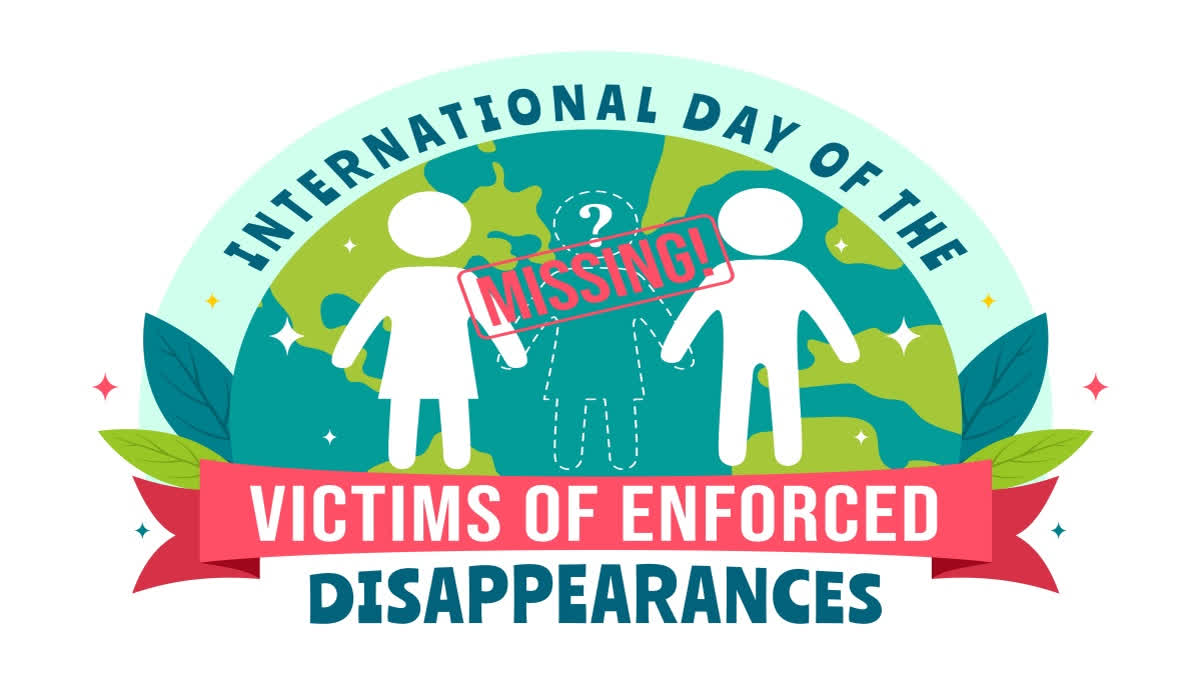Hyderabad: The International Day of the Victims of Enforced Disappearances is observed on August 30. Enforced disappearances involve the arrest or abduction of a person by or on behalf of the state, followed by a refusal by the same authorities to acknowledge it. The move is used as a means to silence the opposition and spread terror.
Enforced disappearances are often used as a strategy to spread terror in society. The feeling of insecurity generated by this practice is not limited to the immediate relatives of the disappeared person but also affects their communities and the whole society.
Enforced disappearances have become a global problem and are not restricted to any particular region of the world. Once largely a product of military dictatorships, enforced disappearances can nowadays be carried out in complex situations of internal conflict, particularly as a means of political repression of opponents.
History of The Day: On 21 December 2010, a United Nations General Assembly resolution expressed "deep concern at the increase in incidents of enforced or involuntary disappearances in various regions of the world, including arrest, detention and abduction, when these are part of or amount to enforced disappearances, and at the increasing number of reports concerning harassment, ill-treatment and intimidation of witnesses to disappearances or relatives of disappeared persons."
The same resolution welcomed the adoption of the International Convention for the Protection of All Persons from Enforced Disappearances, and declared 30 August the International Day of the Victims of Enforced Disappearances.
Where Do Enforced Disappearances Happen?: Enforced disappearances are a serious problem in many countries, in all regions of the world; from Mexico to Syria, from Bangladesh to Laos and from Bosnia and Herzegovina to Spain. Recently Amnesty International has documented disappearances carried out by some of the worst offending countries.
Syria: Some 82,000 people have been subjected to enforced disappearance in Syria since 2011. The overwhelming majority of those have vanished into a network of government detention centres, but over 2,000 individuals have gone missing after being detained by armed opposition groups and the armed group that calls itself the Islamic State.
Sri Lanka: Sri Lanka has one of the world’s highest number of disappearances, with between 60,000 and 100,000 people vanishing since the late 1980s.
Pakistan: Since 2011, at least 10,078 enforced disappearances were recorded by the Pakistan Commission of Inquiry on Enforced Disappearances (COIED). Of them, 3,485 took place in the province of Khyber Pakhtunkhwa, and 2,752 in Balochistan.
Argentina: Perhaps the best-known instance of mass-enforced disappearances in the 20th century was the last dictatorship in Argentina. During military rule in the South American country between 1976 and 1983, the security forces abducted around 30,000 people, many of whom are still unaccounted for.
Bangladesh: Enforced disappearances in Bangladesh, tracing back to the 1971 independence and subsequent years, have alarmingly escalated since the Awami League’s ascent to power in 2009.
Who is at Risk?: Human rights defenders, relatives of those already disappeared, key witnesses and lawyers seem to be particular targets.
Agony And Danger For Families: Family and friends of people who have disappeared experience slow mental anguish. Not knowing whether their son or daughter, mother or father is still alive. Not knowing where he or she is being held, or how they are being treated. Searching for the truth may put the whole family in great danger. Not knowing if their loved one will ever return often leaves their relatives living in limbo.
Serious Violations Of Human Rights: By being taken outside the protective sphere of the law and "disappearing" from society, victims of enforced disappearances are virtually deprived of all their rights and are at the mercy of their abductors.
Some of the human rights that are regularly violated by enforced disappearances are:
The right to recognition as a person before the law;
The right to liberty and security of person;
The right not to be subjected to torture or other cruel, inhuman or degrading treatment or punishment;
The right to life, when the disappeared person is killed;
The right to identity;
The right to a fair trial and judicial guarantees;
The right to effective remedies, including restitution and compensation;
The right to know the truth about the circumstances of the disappearance.
Enforced disappearances generally violate various economic, social and cultural rights of victims and their families:
The right to protection and assistance to family;
The right to an adequate standard of living;
The right to health;
The right to education.



